Joshua Khan and Sam Cary have formed an exciting partnership at The Great Shefford Pub. Joshua’s strong vision and business acumen are ideally complemented by Sam’s accomplished track record as an ambitious young chef grounded in multi-Michelin-starred restaurants. The building which houses The Great Shefford originates from 1848, and was acquired by Joshua in late 2019. The site had been known as the rather dreary locals’ pub called The Swan Inn. Post a full refurbishment, the new venture launched just prior to the pandemic, closed through lockdown rather quickly, then reopened again in late July 2021. Sam joined the operation in September 2021.
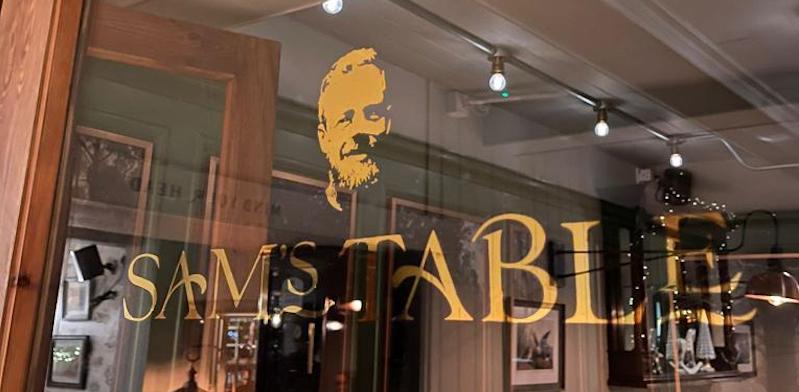
The subsequent development of “Sam’s Table,” which sees a high end dining experience tailored for six to eight guests, is an exciting addition to an impressive à la carte menu in a dining room offering 50 covers. There is also the aptly named Racing Lounge, (a glance around the décor will confirm the link) for up to 30 covers, which is aimed at those guests who are seeking simpler or more comforting fare. Traditional pub visiting locals who want a drink also form part of the vision, with seating space for up to 20 in a consciously distinct bar area. In summer, guests may also look forward to a large, semi-covered outdoor terrace, alongside the Lambourne River, with capacity for up to 100, for both dining and drinking. The atmosphere of the building is of being sympathetically restored with a significant emphasis on the Newbury horse racing fraternity. The main dining room and Sam’s Table are light and airy with pleasant riverside views.
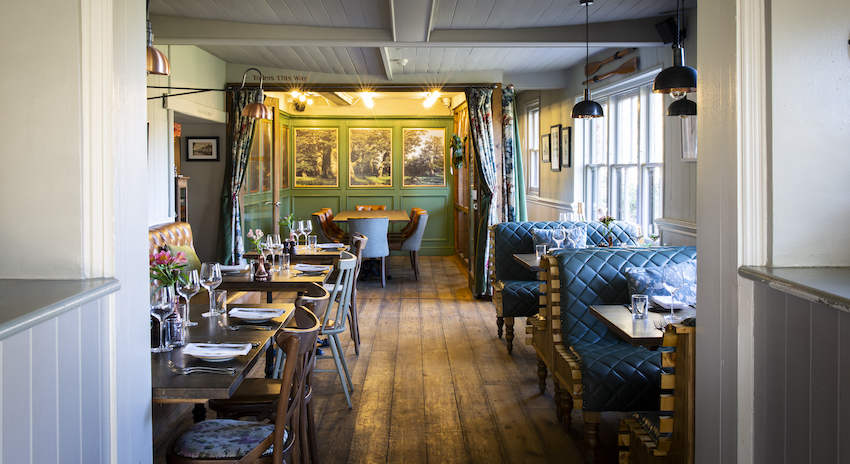
[The Great Shefford Dining Room leading to Sam’s Table]
Necessity has proven the mother of invention for charismatic restaurateur Joshua Kahn, as at times in the face of adversity, he has managed to enjoy quite an extraordinary history of success. His current interests lay in three high end pubs, alongside The Great Shefford is the The King Charles Tavern in Newbury and The Broad Face in Abingdon. Qualified as a medical doctor abroad, Joshua arrived in the UK with but £600 to his name and unable to transfer his qualification. His first role was as a form of labourer, earning £150 a week, moving heavy containers around for a catering company. Joshua and his wife would pay £100 a week in rent and live off the remainder. During that time (2002-2003), they would see the beautiful restaurants on Clapham High Street and Joshua would think “One day we will own a quality restaurant and make the pricing affordable and reasonable to many!” A worthy ambition and one that by a happy sequence of events he was able to realise within two short decades.
After finding a role as a clerk at Nat West Bank, through chance and perseverance, he worked his way up, making use of his multi-lingual translation skills (Joshua is familiar with seven languages). Over time, he gained a network of major banking contacts, one of whom encouraged him to manage the development of a hospitality concept. From 2011, that contact came through and the opportunity arose to work with chef Ollie Couillaud at The Lawn Bistro in Wimbledon Village. Joshua’s appetite for hospitality was whetted, his natural passion and enthusiasm ignited, driving him ever onward to the portfolio of businesses he owns today.
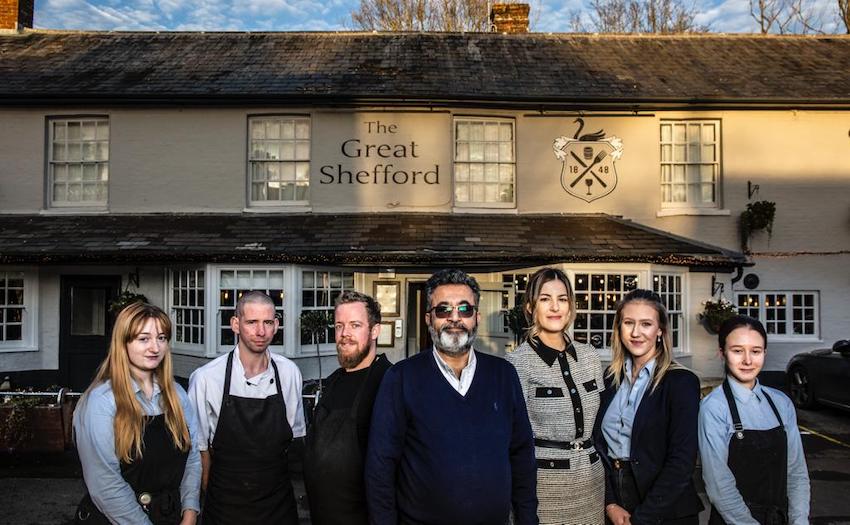
[The team at The Great Shefford: Centre, restaurateur Joshua Khan, Centre Left, Chef Sam Cary]
While growing up in a small village near Chippenham, Sam Cary had always wanted to be a chef. His parents did their best to steer him in the direction of Motorsport engineering. The nostalgia of his grandmother’s roast dinners would always draw him back to food. Having embarked on a career in cooking, Sam has enjoyed some great food mentors such as Tom Kerridge and Niall Keating. Sam remembers learning from Tom Kerridge about the art of maintaining the required pace of a high powered kitchen. He also took onboard the importance of discipline, accuracy and professionalism. “The sheer quality of fresh produce was also a privilege to work with,” explains Sam.
With regards to Niall Keating, Sam recalls, “the reinforcement of attention to detail and working with local suppliers such as the amazing estate reared beef.” In between working with these two Michelin two star giants of the UK industry, Sam spent two years from 2015 cooking in Sydney, Australia. The experience expanded his cultural and cooking horizons, including from a professional perspective making use of a Japanese (Hibachi) grill. Sam explains that the grill is a significant feature of The Great Shefford kitchen: “It provides great smoky subtlety of flavour to a dish,” and further, “the grill takes a whole different level of skill and instinct. The chef must control the heat through managing the coals, to deliver the best impact on flavour!”
After joining The Great Shefford, Sam found a pleasing array of food suppliers in place – Vicars Game for meat and game, Fisher’s of Newbury for fresh fruit and vegetables and fish suppliers are Kingfishers, and so on. Joshua adds; “We consider anything within a 20-25 miles radius as local – it aids the whole community and is a happy circle, supporting artisan suppliers wherever possible!” In terms of menu rotation, Sam aims to get the balance right between monthly and seasonal: The former keeps the kitchen on its toes while naturally allowing the use of artisan suppliers: The latter makes optimum use of best quality products that change with the seasons.
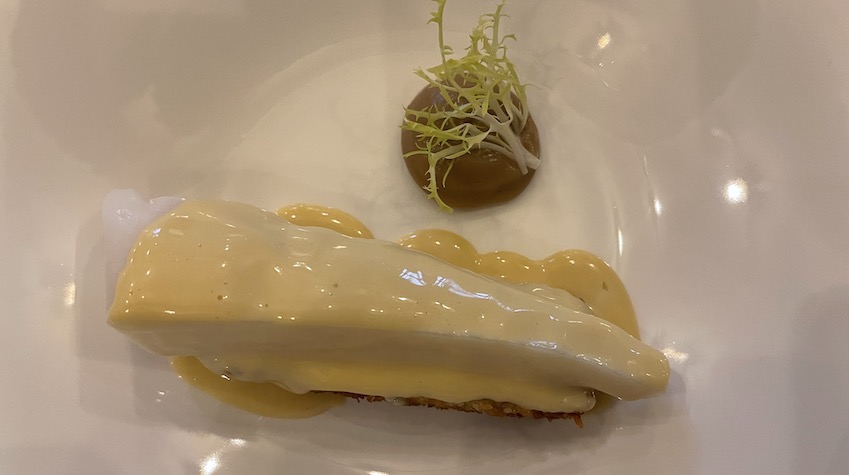
[Outstanding turbot and beef cheek dish with yeast beurre blanc sauce]
A star dish of wild turbot makes the unlikely match of the fish with beef cheek. At first glance, while merely reading on a menu (before tasting) this may appear at best a bold combination – the natural depth of flavour of the lovingly reduced offal might be anticipated to overpower the relatively delicate flesh of the fish. Turbot, however, as arguably the king of fish is more than sufficiently robust. In reality, the end product is beautifully constructed with components naturally enhancing one another and brought together by the expert application of a yeast beurre blanc sauce.
This dish was so impressive, that fine dining guide asked Sam to analyse its construction by the five criteria for a Michelin star. [These criteria were first announced by Michelin at the London launch of Michelin GB&I 2017 and are as follows: The first is the provenance of ingredients (to include quality, freshness, flavour and texture). The second is mastery of cooking techniques. The third is equilibrium and harmony in flavours. The fourth criteria is regularity (or consistency) and this means starter, main and dessert are each of the appropriate standard and that each are also consistent over time. Finally, value for money is the fifth criteria.]
In terms of provenance, the beef cheek is sourced from Vicars Game and the wild turbot is acquired daily from Kingfisher. Cooking techniques see the customary Michelin restaurant multi-stage process of construction and cooking. The turbot is brined for 40 minutes in a 10% salt, 5% sugar fish brine, before it is cooked sous vide at 52 degrees for seven minutes. The whole dish is a couple of days in preparation and execution; the beef cheek is slow cooked at 88 degrees for 12 hours in a red wine based sauce, braised down, picked down, which sees the sauce heavily reduced, creating an intensity of flavour. After setting, the beef cheek it is portioned and finished by frying in panko breadcrumbs. Sam admits to being influenced by Niall Keating, formerly of Whatley Manor, with the savoury yeast beurre blanc sauce that accompanies the turbot. Balance and harmony arrive through serendipity, or rather chef intuition, combined with trial and error in the combinations of components in the dish. In terms of consistency of kitchen output, the sauce is considered by Sam to be the trickiest to deliver as it comes down to taste – the small team of chefs (three) are encouraged to master their palates and taste, taste, taste to get the dish right every time. Consistency is aided by following the timings, quantities and processes found in a recipe book that is maintained in the kitchen. Value for money is more a philosophy of proprietor Joshua Khan’s than represented in any particular dish – Joshua is determined to make the highest quality (Michelin star standard) food available at accessible prices, none more so than that witnessed in the generous à la carte pricing of this dish.
Sam and Joshua both see the inspector-led guides and their recognition for Sam’s cooking as important for The Great Shefford. Indeed, the confidence of the kitchen was evident in the Sam’s Table tasting menu. So much so, that it would suggest that when The Michelin GB&I Guide, the newly re-launched Good Food Guide and AA Restaurant Guide next make announcements, there will be the inclusion of The Great Shefford to the satisfaction of Joshua and Sam.
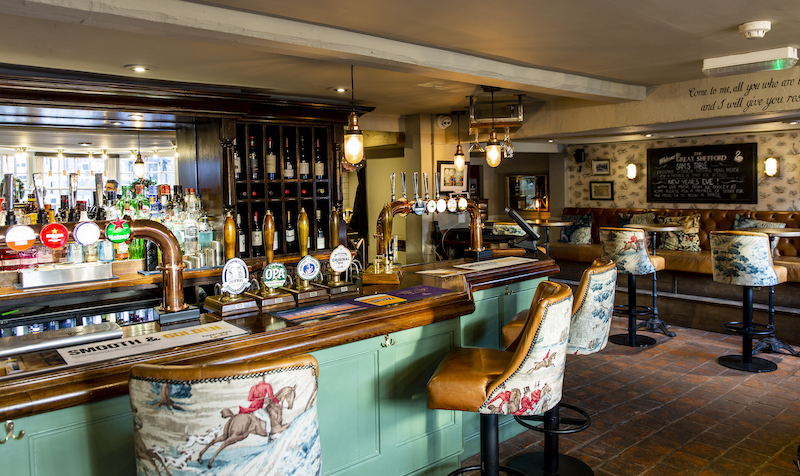
[The Great Shefford: A food led pub with room for a proper locals’ bar area]
An essential part of The Great Shefford experience is the service. This was well informed, charming and unobtrusive in equal measures: Georgina Caras ably directed a small team of front of house that helped make the experience both enjoyable and completely satisfying. So, the early signs look bright for Joshua Khan and Sam Cary and with the hope of the lifting of the Covid-19 pandemic, perhaps 2022 offers the prospect of the most exciting year to date for both restaurateur and chef. fine dining guide looks forward to returning and following their undoubted success with interest.



